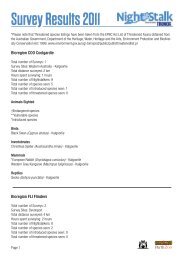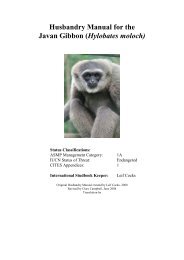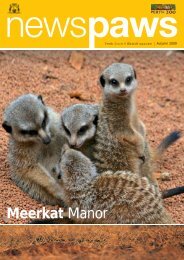Summer 2009 - Perth Zoo
Summer 2009 - Perth Zoo
Summer 2009 - Perth Zoo
Create successful ePaper yourself
Turn your PDF publications into a flip-book with our unique Google optimized e-Paper software.
New Quokka<br />
Breeding Program<br />
Quokkas are once again on display at <strong>Perth</strong> <strong>Zoo</strong> and<br />
they’re here as part of a new nationwide captive<br />
breeding population for the unique marsupial.<br />
<strong>Perth</strong> <strong>Zoo</strong> is leading a program to establish a new<br />
breeding population of Quokkas, working with the<br />
Rottnest Island Authority, Department of Environment and<br />
Conservation and four other Australian zoos. The intent of<br />
the program is to help guard against a decline in Quokka<br />
numbers in the event of disease introduction or natural<br />
disaster. The zoos will also gain valuable insight into the<br />
husbandry and reproductive biology of this species.<br />
So far 15 Quokkas have been moved to the mainland<br />
from Rottnest Island with eight settling into <strong>Perth</strong> <strong>Zoo</strong>.<br />
The Quokkas were selected based on their age, sex and<br />
health and were collected from a number of sites around<br />
the island. Prior to the Quokkas’ departure Aboriginal<br />
Elders performed a traditional smoking ceremony which<br />
farewelled the animals and demonstrated honour and<br />
respect to their ancestors.<br />
In total, 33 Quokkas (five males and 28 females) will help<br />
establish the new breeding population at <strong>Perth</strong> <strong>Zoo</strong>,<br />
Taronga <strong>Zoo</strong>, Melbourne <strong>Zoo</strong>, Gorge Wildlife Park and<br />
Adelaide <strong>Zoo</strong>.<br />
Classified as vulnerable, Quokkas were once abundant on<br />
the Australian mainland but with the arrival of foxes in the<br />
late 1800s their numbers were drastically reduced.<br />
The Quokkas on Rottnest Island are genetically distinct<br />
from the two other Quokka populations in Western<br />
Australia on Bald Island and in Bunbury. Their isolation<br />
means there is a risk of a disease or similar catastrophe<br />
on the island that could affect the population. Maintaining<br />
a captive population in Australian zoos will help guard<br />
against this.<br />
Thank You, Water Corporation<br />
The Water Corporation is<br />
helping <strong>Perth</strong> <strong>Zoo</strong> support<br />
threatened species in the wild<br />
with the production of the <strong>Perth</strong><br />
<strong>Zoo</strong> 2010 Conservation Calendar<br />
that will raise substantial funds<br />
for Wildlife Conservation Action.<br />
The 2010 Conservation Calendar<br />
is full of stunning images of <strong>Perth</strong><br />
<strong>Zoo</strong> animals and contains special<br />
discounts that visitors can use at<br />
the <strong>Zoo</strong> throughout the year. The<br />
calendar also promotes animal<br />
and water conservation messages<br />
to show that small actions can<br />
make a big difference. You can<br />
purchase the calendar from<br />
<strong>Zoo</strong>nique, the <strong>Perth</strong> <strong>Zoo</strong> Shop<br />
for only $2, while stocks last.<br />
The Water Corporation is a<br />
valued partner of <strong>Perth</strong> <strong>Zoo</strong>.<br />
Their sponsorship over the<br />
years has supported <strong>Perth</strong><br />
<strong>Zoo</strong> exhibits including the<br />
Australian Wetlands,<br />
cockatoos and Motorbike<br />
Frog as well as the 2008<br />
Year of the Frog campaign.<br />
The captive population of Quokkas will be managed at a<br />
regional level across the five zoos to ensure high levels of<br />
genetic diversity are maintained and a sustainable<br />
breeding population is formed.<br />
<strong>Perth</strong> <strong>Zoo</strong>’s Quokkas can be seen in the Australian<br />
Bushwalk.<br />
Did You Know?<br />
Rottnest Island got its name from the Quokkas that<br />
inhabit it. Dutch explorer Willem de Vlamingh visited<br />
the island in 1696 and upon seeing the plentiful<br />
Quokkas, which he described as ‘a kind of rat as big<br />
as a common cat’, named the island ‘Rotte Nest’<br />
meaning rat’s nest.<br />
<strong>Summer</strong> <strong>2009</strong>/10 | newspaw s<br />
Photo Daniel Scarparolo/<strong>Perth</strong> <strong>Zoo</strong><br />
7






